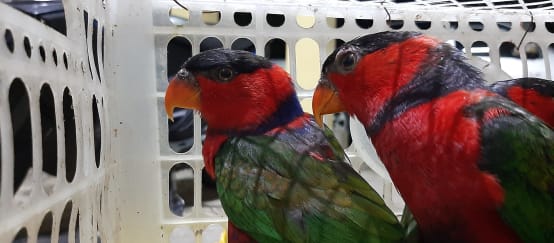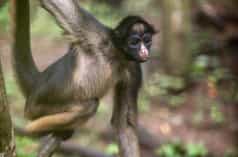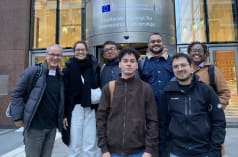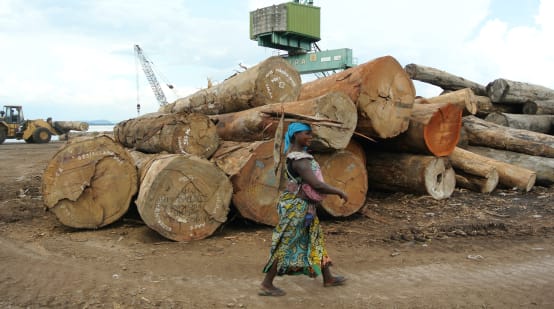Indonesia: ban the trade in wild birds!
 Owl in the cage (© mariusz_prusaczyk/istockphoto)
Owl in the cage (© mariusz_prusaczyk/istockphoto)
It’s a scene out of a nightmare – thousands of birds are packed tightly into small cages in Indonesia’s markets. Trappers supplying these markets are driving thirteen species to the brink of extinction and are having an incalculable impact on biodiversity. Tell the Indonesian government to ban the trade now.
News and updates Call to actionTo: President Joko Widodo and the government of Indonesia
“Endangered birds are being traded on Indonesian markets. The hunt for rare birds is speeding biodiversity loss. Put an end to this cruelty.”
A smuggler was arrested in May 2016 with 23 yellow-crested cockatoos that he had crammed into plastic water bottles. Weakened by their ordeal, half of the birds died. Only 7,000 yellow-crested cockatoos still live in the wild. Richard Thomas of Traffic International explains that the water-bottle method is “commonly used to smuggle these protected birds”.
Many Indonesians keep wild birds as pets and status symbols, and trade with birds captured in Indonesia’s forests is reaching dramatic proportions. Ornithologists fear that trafficking is accelerating the extinction of numerous species. According to a study, ruthless trappers are threatening the existence of 13 species and 14 subspecies, including Indonesia's national bird, the Javan hawk-eagle (Nisaetus bartelsi) and the Javan green magpie (Cissa thalassina).
The offerings at Jatinegara bird market in Jakarta include chattering lories – forest-dwelling parrots found only in North Maluku whose population has plummeted by as much as 50 percent in the last past 25 years.
Indonesia has an abundance of bird life: scientists have counted 1,615 species, of which 419 are endemic. The destruction of Indonesia’s rainforests is cutting into their habitat, however, and hunting is worsening the situation. The knock-on damage of the bird trade is incalculable, as many tree species depend on birds for their seed dispersal.
A study by Oriental Bird Club counted no less than 19,000 birds, many of endangered species, in three markets in Jakarta alone.
While the birdcatchers mainly supply the domestic market in Indonesia, the international bird trade is also big business. Rainforest Rescue therefore advocates a worldwide ban.
Please call on Indonesian President Joko Widodo and his government to ban the trade in wild birds.
BackgroundSelling Noah's Ark? The Collapse of Asia's Bird Biodiversity
An Indonesian bird market
To: President Joko Widodo and the government of Indonesia
Dear Mr. President,
Ladies and Gentlemen,
Live birds are held in appalling conditions and traded on Indonesian markets. Among them, endangered species are not uncommon. Ornithologists fear that the trade is accelerating the extinction of numerous species.
The offerings at the Jatinegara bird market in Jakarta include chattering lories – forest-dwelling parrots found only in North Maluku whose population has plummeted by as much as 50 percent in the last past 25 years. In May, the arrest of a smuggler who had crammed 23 yellow-crested cockatoos into plastic water bottles caused an outcry, both in Indonesia and internationally.
Considering the vital role birds play in seed dispersal in forests, the knock-on effects of the wild-bird trade are causing incalculable damage to Indonesia’s environment.
Please ban the wild-bird trade and free the birds!
Kind regards,
We have retired this petition for the following reasons:
- Rainforest Rescue has been working on the front lines against bird trafficking in Indonesia with our partner organization Flight since 2019.
- Flight delivered the petition with more than 200,000 signatures to the government in Jakarta in 2020.
- Since then, Flight has conducted numerous seminars with police and authorities. Awareness among the authorities and the general public has grown.
- We were unable to achieve a blanket ban, and so hundreds of bird markets and thousands of small vendors in these markets remain active.
- The most effective approach is to reduce the capture and smuggling of birds directly in the forests. Flight’s presence in many of Indonesia’s forested areas makes this possible.
- In Sumatra, bird trapping, trade and smuggling have decreased significantly. Many offenders have been arrested and convicted. Bird mafia rings have either given up or gone bankrupt.
- The bird trade has shifted to eastern Indonesia. Increasing numbers of birds from the Moluccas and Papua are transported by sea to the Philippines via Java and Sulawesi.
Rescued: Proboscis monkeys, leopard cats and black-capped lories returned to the wild

Rescuing wildlife from smugglers, fighting the trade in exotic birds, and releasing songbirds back into the wild – the wildlife conservationists of our Indonesian partner Flight are making a difference.
Harry Potter and Indonesia's owls
Are the Harry Potter books to blame for the suffering of thousands of owls on Indonesian bird markets? That is the conclusion reached by two researchers at Oxford Brookes University. Since the publication of the books, in which owls play a role as messengers and companions, the number of owls found on the markets has skyrocketed.













 Recent successes
Recent successes